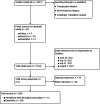Knowledge user survey and Delphi process to inform development of a new risk of bias tool to assess systematic reviews with network meta-analysis (RoB NMA tool)
- PMID: 35948412
- PMCID: PMC11372759
- DOI: 10.1136/bmjebm-2022-111944
Knowledge user survey and Delphi process to inform development of a new risk of bias tool to assess systematic reviews with network meta-analysis (RoB NMA tool)
Abstract
Background: Network meta-analysis (NMA) is increasingly used in guideline development and other aspects of evidence-based decision-making. We aimed to develop a risk of bias (RoB) tool to assess NMAs (RoB NMA tool). An international steering committee recommended that the RoB NMA tool to be used in combination with the Risk of Bias in Systematic reviews (ROBIS) tool (i.e. because it was designed to assess biases only) or other similar quality appraisal tools (eg, A MeaSurement Tool to Assess systematic Reviews 2 [AMSTAR 2]) to assess quality of systematic reviews. The RoB NMA tool will assess NMA biases and limitations regarding how the analysis was planned, data were analysed and results were presented, including the way in which the evidence was assembled and interpreted.
Objectives: Conduct (a) a Delphi process to determine expert opinion on an item's inclusion and (b) a knowledge user survey to widen its impact.
Design: Cross-sectional survey and Delphi process.
Methods: Delphi panellists were asked to rate whether items should be included. All agreed-upon item were included in a second round of the survey (defined as 70% agreement). We surveyed knowledge users' views and preferences about the importance, utility and willingness to use the RoB NMA tool to evaluate evidence in practice and in policymaking. We included 12 closed and 10 open-ended questions, and we followed a knowledge translation plan to disseminate the survey through social media and professional networks.
Results: 22 items were entered into a Delphi survey of which 28 respondents completed round 1, and 22 completed round 2. Seven items did not reach consensus in round 2. A total of 298 knowledge users participated in the survey (14% respondent rate). 75% indicated that their organisation produced NMAs, and 78% showed high interest in the tool, especially if they had received adequate training (84%). Most knowledge users and Delphi panellists preferred a tool to assess both bias in individual NMA results and authors' conclusions. Response bias in our sample is a major limitation as knowledge users working in high-income countries were more represented. One of the limitations of the Delphi process is that it depends on the purposive selection of experts and their availability, thus limiting the variability in perspectives and scientific disciplines.
Conclusions: This Delphi process and knowledge user survey informs the development of the RoB NMA tool.
Keywords: evidence-based practice; health care quality, access, and evaluation; health services research; methods.
© Author(s) (or their employer(s)) 2023. Re-use permitted under CC BY-NC. No commercial re-use. See rights and permissions. Published by BMJ.
Conflict of interest statement
Competing interests: AAV was an Associate Editor for the journal, but was not involved with the decision or peer-review process.
Figures


